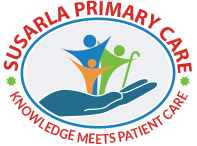Dehydration Disasters
- Drink plenty of fluids
- Take regular breaks by the shade
- Try and schedule your most vigorous activities early in the morning or evening when the sun isnt so intense
- If you suspect a heatstroke, go to the ER!!
Boating Accidents
To help prevent and prepare for capsizing, swamping, or someone falling overboard, follow these guidelines.
- Make sure that you and your passengers are wearing life jackets while the boat is underway
- Attach the ignition safety switch lanyard to your wrist, clothes, or life jacket
- Don’t allow anyone to sit on the gunwale, bow, seat backs, motor cover, or any other area not designed for seating. Also, don’t let anyone sit on pedestal seats when operating at a speed greater than idle speed
- Don’t overload your boat. Balance the load of all passengers and gear
- Keep your center of gravity low by not allowing people to stand up or move around while underway, especially in smaller, less-stable boats
- In a small boat, don’t allow anyone to lean a shoulder beyond the gunwale
- Slow your boat appropriately when turning
- Don’t risk boating in rough water conditions or in bad weather
- When anchoring, secure the anchor line to the bow, never to the stern
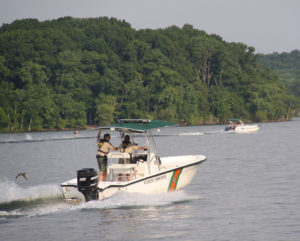
Insect Bites and Stings
All stings and bites respond to the following treatments.
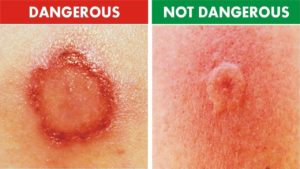
Move to a safe area to avoid more stings.
-
- Remove the stinger, especially if it’s stuck in your skin. It is very important to remove a bee stinger quickly, if it is still embedded in the skin, in order to prevent further venom from entering the skin. Gently scrape it off horizontally with the edge of a credit card or your fingernail. Avoid tweezers, as this may squeeze more venom into the wound. Wash area with soap and water. The swollen area may increase in size for two to three days after a bee sting or mosquito bite.
- To remove an imbedded tick, using tweezers, grasp the tick as closely to the skin as possible. Gently tug on the tick. Do not twist or “unscrew” the tick. Don’t worry if the head remains imbedded in the skin. It will eventually come out on its own. Clean the area with an antiseptic.
If necessary, to reduce swelling and pain:
-
- Take pain relievers such as acetaminophen (Tylenol) or ibuprofen (Advil, Motrin).
- Apply a cold pack or cloth filled with ice to reduce pain and swelling.
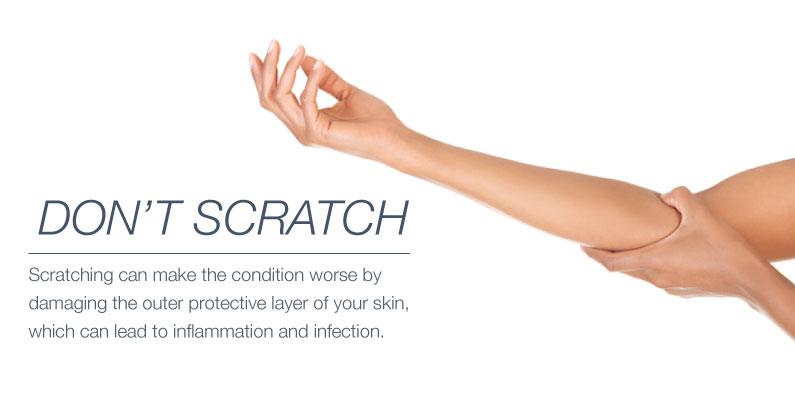
To reduce itching and discomfort, apply one of the following to the bite or sting several times a day until symptoms subside:
- Hydrocortisone cream to any part of your body except the areas around the eyes or genitals (0.5 percent or 1 percent over-the-counter formulation)
- Calamine lotion
- A baking soda paste made in a ratio of 3 teaspoons baking soda to 1 teaspoon water
- Take an antihistamine (for children under age six, contact your provider for dosing.
- To avoid the risk of infection, do not scratch the area. The signs of infection include, but are not limited to, increasing redness, pain, swelling and heat to the site. You may also notice a red streak on the area and/or pus from the site. If you have any signs of infection, notify your health care provider for treatment.
Poison Ivy
A poison ivy rash will eventually go away on its own. But the itching can be hard to deal with and make it difficult to sleep. If you scratch your blisters, they may become infected. Here are some steps you can take to help control the itching:
- Apply an over-the-counter corticosteroid cream for the first few days
- Apply calamine lotion
- Take oral antihistamines, such as diphenhydramine (Benadryl, others), which may also help you sleep better
- Soak in a cool-water bath containing an oatmeal-based bath product (Aveeno)
- Place cool, wet compresses on the affected area for 15 to 30 minutes several times a day
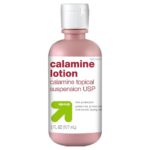
Fireworks Safety
If fireworks are legal to buy where you live and you choose to use them, be sure to follow the following safety tips:
- Never use fireworks while impaired by drugs or alcohol
- Never allow young children to handle fireworks
- Older children should use them only under close adult supervision
- Anyone using fireworks or standing nearby should wear protective eyewear
- Never light them indoors
- Only use them away from people, houses and flammable material
- Only light one device at a time and maintain a safe distance after lighting
- Never ignite devices in a container
- Do not try to re-light or handle malfunctioning fireworks
- Soak unused fireworks in water for a few hours before discarding
- Keep a bucket of water nearby to fully extinguish fireworks that don’t go off or in case of fire
- Better yet, grab a blanket and a patch of lawn, kick back and let the experts handle the show

https://www.webmd.com/skin-problems-and-treatments/features/top-7-summer-health-hazards#4
